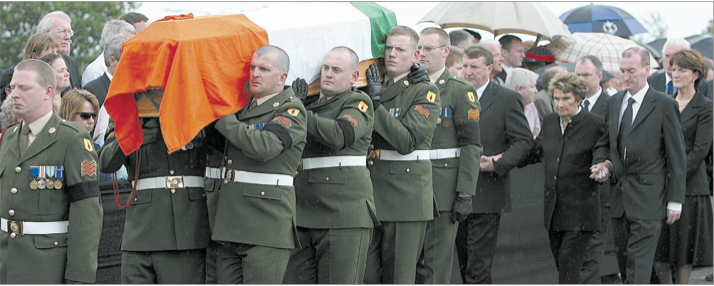Charles J. Haughey, former Taoiseach (Irish prime minister) and ex-leader of the Fianna Fáil party, was buried in Dublin following a long illness. Haughey, aged 80 years, was afforded all the trappings of a state funeral, but the Irish public remains divided by the many contradictions surrounding his leadership and lifestyle. Although he remained a figure of considerable curiosity, his popularity declined steadily in recent years, a trend reflected by a low turnout at his final farewell. Taoiseach Bertie Ahern, one of Haughey’s successors as leader of Fianna Fáil, gave a graveside oration. He praised his predecessor with an understated reference to evidence of systematic corruption while Haughey was in office. Ahern said history would judge the former leader very favorably. “As one of Mr. Haughey’s successors as Taoiseach I want to acknowledge that he left a huge legacy of lasting achievement which this generation has based its own progress upon,” he told the funeral attendance. “History will favorable record that from 1988 Charlie Haughey took the first steps on a long road to peace.” Haughey’s achievements – most notably opening discussions with the Provisional IRA as a prelude to ceasefire in Northern Ireland and also making a personal project of initiating the hugely successful Financial Services Centre in Dublin – will certainly stand in his favor. However, many of his triumphs are overshadowed by a reputation for cronyism, corruption and hypocrisy typified by his lavish personal lifestyle indulged during a period of severe economic hardship at national level. The former Taoiseach’s record sparks heated public debate and he is certainly one of the most intriguing figures to dominate the Irish political landscape. The state tribunal set up to investigate corruption in public life found that Haughey was generously bankrolled by various businessmen, and although it has been difficult to prove that these payments resulted directly in advantage to his benefactors, the ex-Taoiseach never declared massive payments and so avoided paying tax due to the very state of which he was elected leader. Bertie Ahern is often regarded as a protégé of Haughey’s, but the relationship between the two politicians became more difficult when Haughey’s reputation became tarnished by evidence that he abused his position in public office. Back in 1997 Ahern did not name Haughey when he said that “there would be no place in our party today” for anyone who took gifts or bribes, adding that “no one is welcome in this party if they betrayed the public trust.” Even without naming Haughey, it was clear to whom Ahern was referring. The remarks were seen as an attempt by Ahern to make a break with the past. However, all of this detachment was duly forgotten at Haughey’s graveside. “In this passage of time since his retirement, despite the controversies, even political opponents acknowledge that he had indeed done the state some service,” declared Ahern. “I have no doubt that the ultimate judgement of history will be positive. He was one of the most consequential of Irishmen. When the shadows have faded, the light of his achievements will remain.” Many of Haughey’s associates attended the funeral service. The congregation included several public figures who have featured prominently throughout the tribunals – most particularly disgraced former Minister for Finance Ray Burke. The assembly of Fianna Fáil’s ‘old guard’ suggested that time and public patience have caught up on this once powerful group. Full military honors were accorded the cortege along with all the regalia of a state funeral. Plans for the service, it transpired, were devised by Charles Haughey himself. In addition to hundreds of mourners known to the family, organizers expected crowds of about 15,000 to flock to the northside Dublin suburb of Donnycarney for the funeral. Such predictions proved greatly exaggerated. At Haughey’s removal, fewer than 1,000 people showed up to pay their final respects. ♦
State Bids Farewell to Haughey


Leave a Reply